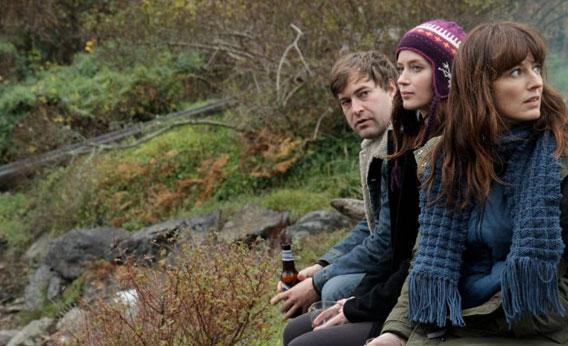In its best moments Your Sister’s Sister (IFC Films) feels quietly radical, as if its director, Lynn Shelton, were reinventing romantic comedy. Like Shelton’s last film, Humpday, this is a three-person chamber piece about close relationships in a state of flux. And as in Humpday, this movie’s dialogue moves with a freshness and spontaneity that sounds improvised, even as the precisely marked story beats reveal the writer/director’s hand at work. Until it strains in the closing scenes for a rushed, overly tidy resolution, Your Sister’s Sister is at times reminiscent of Andrew Haigh’s wonderful Weekend: A keenly observed romance whose apparent rough-edged naturalism masks a considerable degree of craft.
Your Sister’s Sister follows two sets of siblings whose stories crisscross and entangle, even though only three of the four people involved are present onscreen. Jack (Mark Duplass) is the younger brother of Tom, who has died a year before the story begins: We see him only as a series of photographs at the memorial party that opens the movie. Iris (Emily Blunt) was Tom’s girlfriend; in the year since his death, she’s become close friends with Jack. At the party to commemorate the one-year anniversary of Tom’s death, Jack cuts off a friend’s hagiographic toast to his brother with a drunken, rambling speech cataloguing Tom’s character flaws. Iris, sensing that Jack’s grief has stranded him in a bad place, convinces him to go away on his own to spend time at her family’s cabin on a remote island in Puget Sound.
But as it turns out, the cabin isn’t empty: Iris’ older sister Hannah (Rosemarie DeWitt), having just left her girlfriend of seven years, is holing up there licking her wounds. On their first night there together, Jack and Hannah start telling their stories and warming to each other over a bottle of tequila—and then another bottle of tequila—and then a shot of something that looks disturbingly like crude oil. Somewhere around dawn, it starts to seem like a good idea to sleep together, so brusquely and unceremoniously, they do.
The next morning, before the two have even had time to wake up and assess the state of their hangovers, Iris shows up at the cabin door, and an awkward few days ensue as Hannah and Jack scramble to prevent her from finding out what happened between them, while carrying on tense whispered debates behind her back about just what exactly did happen.
The scene in which these two nervous, defensive charmers drunkenly banter their way into bed is the movie’s tour de force, with DeWitt’s tart, acerbic wit a perfect foil to Duplass’ bumbling sweetness. The humor in this scene—and also in the best moments between Iris and Jack, as they circle each other trying to decide how honest to be about the growing attraction between them—comes not from setups and punchlines but from subtle shifts in the characters’ interactions and alliances.
Shelton has an unusual working process, with actors living in close quarters and improvising on a skeleton script during concentrated shoots (filming of Your Sister’s Sister took place over the space of 12 days). The results of this intimate collaborative process are evident in the director’s wonderfully light touch with actors. Rosemarie DeWitt has been memorable in everything she’s done, but she tends to play serene, subdued women: In Rachel Getting Married, she was the grounded bride-to-be, in Company Men the pragmatic, loving wife. As the sharp-tongued, impulsive, at times monstrously selfish Hannah, DeWitt is a revelation. Thanks to her dexterity as an actor, we don’t give up on Hannah even after a late plot twist calls her motives into question.
Mark Duplass (who stars in three movies coming out this summer; his own fifth feature, The Do-Deca-Pentathlon, co-directed with his brother Jay, opens in July) makes for a refreshing romantic hero. Both here and in Safety Not Guaranteed, he plays men who genuinely seem to enjoy the company of women, and who, for all their introspection and neuroses, are unplagued by the familiar man-cave anxieties of too many onscreen bros. As the eager-to-please Iris, Emily Blunt is as luminous and charming as ever, though her character never emerges into sharp relief the way the other two principals do. We never hear much, if anything, about Iris’ own grief for her dead boyfriend Tom, and given what we learn about Hannah in the last third of the movie, Iris starts to seem less like a devoted younger sibling than a self-deluding doormat.
Your Sister’s Sister also has a significant third-act problem, which I can’t get into here without spoiling the rest of the movie. Suffice it to say that the focus abruptly turns from the shifting emotional dynamics of the central threesome to a high-stakes plot twist straight out of a telenovela. There are a few late scenes so incongruent with the movie’s tone they almost seem like a studio-mandated happy ending. By that time, we care about the characters enough that we’re willing to overlook a far-fetched implausibility or two. But it’s disappointing when a movie that’s invested so much time creating nuanced, ambiguous relationships ends on a note of pat reconciliation—a literal and figurative group hug.
